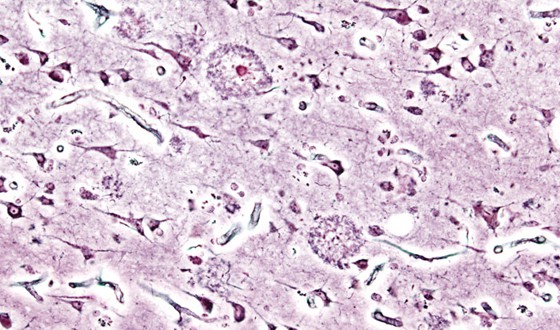
Histopathogic image of senile plaques in the cerebral cortex in a patient with pre-senile onset Alzheimer’s disease
Pfizer and Johnson & Johnson have conceded defeat in their bid to develop an intravenous (IV) formulation of Alzheimer’s immunotherapy bapineuzumab after negative results in a second phase III.
The two companies announced their intention to discontinue the programme yesterday after a trial showed the drug provided no cognitive or functional benefit in patients with mild-to-moderate Alzheimer’s disease who did not carry an Alzheimer’s associated gene called ApoE4.
Last month, a phase III trial of IV bapineuzumab in ApoE4 carriers – who tend to have a higher risk of developing Alzheimer’s earlier – also failed to show any impact on dementia symptoms or the ability of patients to carry out everyday activities.
With two failed trials in hand, Pfizer and J&J have decided to discontinue all phase III trials of the IV version of the drug, which is designed to break down the amyloid plaques characteristically found in the brains of Alzheimer’s patients. A phase II neuroimaging trial of a subcutaneous formulation of the drug will however continue.
J&J also said it would take a charge of $300m-$400m in the third quarter as a result of the discontinuation of the programme.
The failure has wider implications however as it provides yet more evidence that targeting amyloid in Alzheimer’s may not be an effective treatment option, at least where the plaques are already in evidence.
All eyes are now on another amyloid-targeting therapy – Eli Lilly’s solanezumab – which is due to generate phase III data later this year. Many analysts are already discounting any chance of success for Lilly’s drug, given that it too is designed to attack already-present amyloid plaques.
Researchers are now increasingly arguing that any amyloid-based approach to treat Alzheimer’s would have to interrupt the pathway earlier on in the process, before plaques are laid down and the neurodegeneration has taken hold.
“We are saddened by the lost opportunity to provide a meaningful advance for patients afflicted with mild-to-moderate Alzheimer’s disease and their caregivers,” commented the head of Pfizer’s primary care medicines development group Steven Romano.
He added that subgroup and biomarker analyses are underway that will “further inform our understanding of this complex disease and advance research in this field”.
If solanezumab also fails, it is likely that efforts will increasingly shift towards much earlier intervention in Alzheimer’s.
One such approach was announced earlier this year when Genentech said its anti-amyloid antibody crenezumab would be used to try to prevent Alzheimer’s in a group of patients who are currently healthy but have a genetic predisposition to develop the disease in their 40s.
Other research groups are moving on from amyloid as a target altogether, and focusing other hallmarks of Alzheimer’s pathology, including the production of abnormal versions of a protein called tau that aggregates into tangles which correlate closely with neuronal loss and dementia symptoms.




